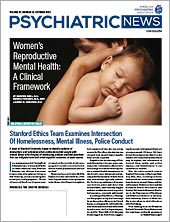An article in July’s Molecular Biology did not surprise most psychiatrists, but it was interpreted by some as proof that we are prescribing antidepressants without knowing what we are doing. The article, “The Serotonin Theory of Depression: A Systematic Umbrella Review of the Evidence,” by Joanna Moncrief, M.D., et al., reported on a modified meta-analysis of existing systematic reviews and meta-analyses to determine whether the serotonin hypothesis of depression has been supported. The researchers concluded that it has not. Unfortunately, though, they also stated, “The idea that depression is the result of abnormalities in brain chemicals … provides an important justification for the use of antidepressants.”
There are practitioners who see proposed mechanisms of action as support for therapeutic choices. This idea becomes difficult to sustain, however, when we acknowledge that disparate theories of mechanism are attributed to diverse treatments that share a common outcome: serotonin-norepinephrine reuptake inhibitors, selective serotonin reuptake inhibitors, norepinephrine-dopamine reuptake inhibitors, monoamine oxidase inhibitors, electroconvulsive therapy, transcranial magnetic stimulation, vagus nerve stimulation, N-methyl-D-aspartate antagonists, mood stabilizers, and psychotherapy. Our reductionist attempts to understand mechanisms too often suffer from errors conceptualizing across scales. We forget about emergent properties at higher levels of complexity and attempt to explain phenomena from the observable scales with which we are most familiar.
Our interest in understanding mechanism of action isn’t even peaked until we have observed that there is an action to start with: the outcome of a treatment. We can avoid teleological errors in clinical situations by sticking to outcome data. Once a successful treatment is replicated and standardized, it becomes its own indication. As I stress in Rational Psychopharmacology: A Book of Clinical Skills, we should always be making treatment recommendations based on the outcomes of randomized, controlled clinical trials, not the theories behind them.
We do yearn to know the processes behind successful treatment outcomes, out of intellectual curiosity and the hope that such knowledge may lead to new treatment options that can be investigated. As psychiatrists, though, we must remember that our hypotheses about cause are just that—educated guesses that must be tested, and not a substitute for reality. We best avoid reification by employing abductive reasoning in clinical practice: hypothesizing, testing, revising the hypothesis, retesting, and repeating this process until we have a supportable answer. We hypothesize about mechanisms, diagnoses, and the best treatment plans. Thanks to clinical trials, though, the treatments themselves are no longer hypotheses; they are supportable, reproducible outcomes shown to be acceptably safe.
Just as DSM-III in 1980 abandoned the spurious value of presumed etiology of psychiatric diagnoses, we need to be ever vigilant to exclude presumed, unproven mechanisms from today’s treatment plans. In the psychiatrists’ office, outcome data matter and theories do not—the essence of evidence-based medicine.
The primary authors of an article posted July 19 in Psychology Today wrote that antidepressant use had reached “epidemic proportions” due to “the false belief that depression is due to a chemical imbalance.” Dr. Moncrief is correct that we should not be telling our patients we recommend antidepressants because of a chemical imbalance—we should be suggesting they take them because we know that they help a large number of patients.
Psychiatrists offer patients a therapeutic alliance and our problem-solving skill, not just factual knowledge. To help them, we must know what works and how to use it effectively and safely. A proven mechanistic explanation, which might be reassuring to some, is still secondary; an unproven one, irrelevant. I have often admitted to patients that while we wish we knew why a treatment worked, I would rather be able to offer them options that we know help and are safe than understand completely the pathology of a disease or illness that we have no treatment for.
We must not be ashamed that we offer proven and safe treatments that may lack full explanation, nor be intimidated by the incomplete knowledge we share with those who would criticize our efforts. Adhering to the path of evidence-based medicine allows us to find answers through darkness and uncertainty, a journey we take with our patients for their benefit. ■

